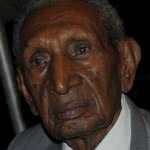 We were saddened to learn today (30 December 2013) of Sergeant Ben Moide’s passing in Port Moresby.
We were saddened to learn today (30 December 2013) of Sergeant Ben Moide’s passing in Port Moresby.
However we will be eternally grateful that Ben’s heroic story has been captured by Mr Lahui Ako in his book ‘Nameless Warriors’ published by the University of Papua New Guinea Press and Bookshop in 2012. Lahui Ako wrote of his race against time to complete the book. He was aware ‘that God could call the old man to rest at any time while I laboured on. So in between writing, prayers went up to the Almighty to allow the old man to live longer in order to personally witness the completion of this project.’
We can only thank God his prayers were answered because Ben Moide’s story is a vital contribution to our understanding of the complexities of the war from a Papuan viewpoint. This aspect has been neglected by recent authors and publishers on the Kokoda campaign because of their own lack of empathy with PNG. Lahui Ako discovered this when he was advised by a potential Australian publisher that Ben Moide’s version of the Kokoda campaign ‘was not recognised in Australia’.
This should have been no surprise because the Australian commentariat still cannot bring themselves to acknowledge that ‘Kokoda Trail’ is the official name of the Battle Honour awarded to Ben Moide’s Papuan Infantry Battalion (PIB) and to the 10 Australian battalions who fought in the Kokoda campaign. Nor can they accept that the original mail route between Owers Corner and Kokoda was gazetted ‘Kokoda Trail’ by Chief Minister Michael Somare in 1972.
Any mention of Ben Moide’s passing in the Australian media will use the politically correct term, ‘Kokoda Track’, in any reference to his active service.
According to Lhui Ako ‘the Papuan Infantry Battalion acted as the eyes and ears of the Australian digger, leading him into the unknown; mostly into places where he himself, in peacetime, wouldn’t have dared to tread, because of tribal animosities and the traditional beliefs of the dark arts.’
He then gives a strong hint of the complexities faced by young Papuans when he described Ben Moide as ‘an eighteen year old Sergeant of mixed Motuan and Kiwai parentage, not initiated yet in tribal lore, born and bred away from the birthplace of my father where the warrior culture was still brimming with life to do to being passed over by the missionaries – to be given the responsibility of leading grown men; men who had faced tribal enemies and killed and smeared their enemy’s blood all over their faces to justify a kill; men of another tribe.’
He wrote:
‘Ben Moide, being a teenage NCO (Non-Commissioned Officer) and the only Kiwai NCO at that, until the PIB C Coy (Charlie Company) was raised made up predominately of men from the Kiwai areas would have surely raised and caused uneasiness and great jealousy among older Gulf NCOs as to why a kid of mixed Kiwai and Motuan parentage who could speak the taubada’s (white man’s) language well, brought up not in his father’s tribe but in his mother’s tribe, and one so young at that who had not even been initiated into the world of the man – was now deemed initiated by the taubadas to lead men to war. To the older NCOs this was an outrage and cause for disrespect to their tradition and the memories of their forefathers. Even with C Coy, he was regarded with suspicion because of his heritage. As such, his life was constantly in danger from all angles throughout the war’.
‘The PIB, formed purposely for reconnaissance, combat and guerrilla operations, fought because the taubadas told them to. However the fact remains, this was an outsider’s war and would be recorded as thus, a war fought by Australians for the Australian motherland.’
Seventy-one years on the Australian Government still has not grasped this essential point.
Lahui Ako describes it thus:
‘For most Papuans, the events which unfolded between 1942 and 1945 marked a turning point in the history of their interactions with the colonial ‘master’. For some, the war represented opportunities for pay-back killing, while for others it provided opportunities for improved status and new ideas and skills which could be used to challenge the authority of the master. In many areas, where warrior status had been laid to rest by the missionaries, taking up weapons again to fight, albeit in the taubada’s war, greatly enhanced one’s status and permanently changed one’s view of the outside world.
‘For the Papuans, there was no concept of ‘nation’ as understood by the taubada’s. The Papuans were tribally oriented and horizons merely extended to the top of the nearest mountain. Loyalty was to a bloodline (extended family), and even within this extended family structure, there were deadly enemies. The arrival of the war gave traditional enemies the opportunity to get at each other’s throats again, but this time, with the full blessing of the warmongers.’
In his interview with the author, Ben Moide, said:
‘We fought, but to the bulk of the taubadas we remained nameless; we were just the native scout or the Papuan guide to them. Still, to the gallant few who addressed us by name I owe them my undying gratitude for treating us as mates. But the fact remains, without the help of all those nameless warriors and carriers who braved the sickness, rain, mud, hunger, despair and enemy of this campaign, all would have been lost.’
According to the author of war history of the Papuan Infantry Battalion, G.M.Byrnes, documents captured at Gona in the Northern District of Papua revealed that the Japanese referred to the PIB as Ryokuin (Green Shadows). ‘The few Japanese prisoners interrogated said they were warned against armed Papuans and respected them for their ability to fade into and then reappear from the jungle as if they were shadows.’
Ben Moide fired the machine gun burst into an ambush position against the advancing Japanese soldiers at Awala on 23 July 1942. It was a historic action that is now commemorated as Remembrance Day in Papua New Guinea.
After the war Ben raised a family and was engaged as a driver for Governor Sir Hubert Murray. He was a keen rugby player and later worked with the San Miguel and SP brewery before retiring in 1991.
In later years Sergeant Ben Moide emerged as the symbol of service and sacrifice of the PIB. He was revered by all who knew him.
E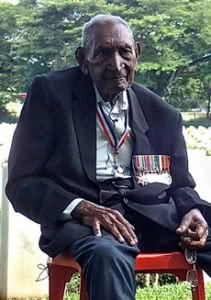 arlier this year Jason Daniels, of the Australian War Graves Unit in Port Moresby, was present at an interview with Ben. He wrote:
arlier this year Jason Daniels, of the Australian War Graves Unit in Port Moresby, was present at an interview with Ben. He wrote:
‘In a moment of peace, away from the lights and cameras, I asked Ben the same questions and got a whole world of personal stories from the old Papuan from Pari Village. I asked him about his CBE, his Commander of the most excellent Order of the British Empire…
‘He said he travelled to London so the Queen could tap him on the shoulder and say thank you. He said the Queen and Ben were now good friends and if I was ever to meet the Queen, I should mention Ben’s name.’
Former NSW Premier and Foreign Affairs Minister, Bob Carr, once wrote: ‘the Men of Kokoda are among the greatest of heroes in a land that rightly canonizes few heroes. And as time slowly steals the survivors from our midst, it’s hard to resist thinking that Australians in the not too distant future will look back with almost disbelief at the giants who lived in those days.’
Sergeant Ben Moide CBE is one such giant of his era. He will be sadly missed.
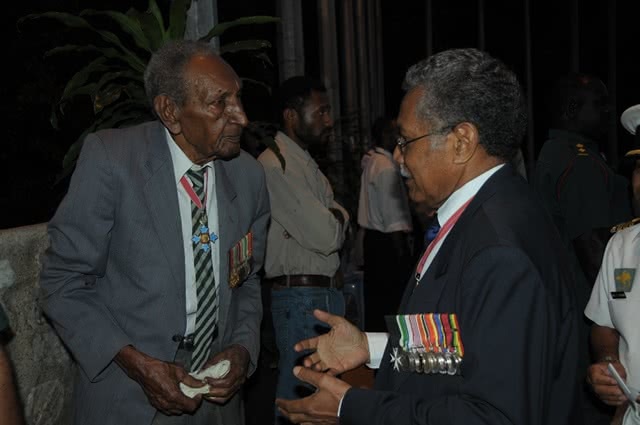 Two old soldiers: Sergeant Ben Moide with Brigadier Ted Diro at the 2008 Remembrance Day Service in Port Moresby
Two old soldiers: Sergeant Ben Moide with Brigadier Ted Diro at the 2008 Remembrance Day Service in Port Moresby
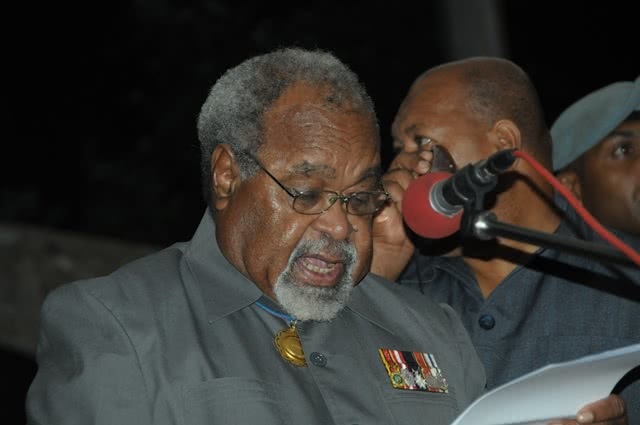 PNG Grand Chief, The Hon Sir Michael Somare addressing the 2008 Remembrance Day Service
PNG Grand Chief, The Hon Sir Michael Somare addressing the 2008 Remembrance Day Service
 Chief of the PNG Defence Force, Commodore Peter Ilau DMS CBE lays a wreath at the Remembrance Day Service
Chief of the PNG Defence Force, Commodore Peter Ilau DMS CBE lays a wreath at the Remembrance Day Service
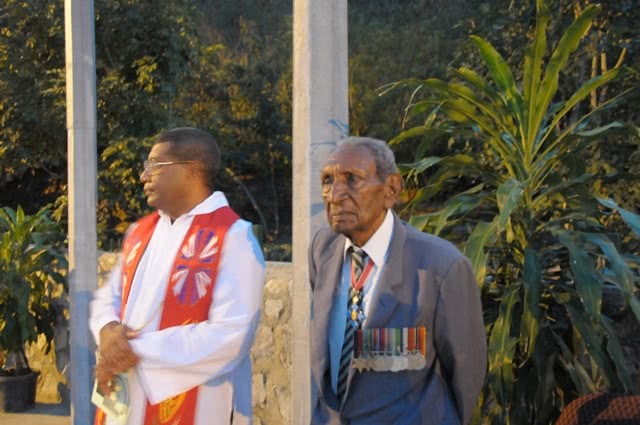 Sergeant Ben Moide CBE with the presiding Chaplain of the PNGDF
Sergeant Ben Moide CBE with the presiding Chaplain of the PNGDF
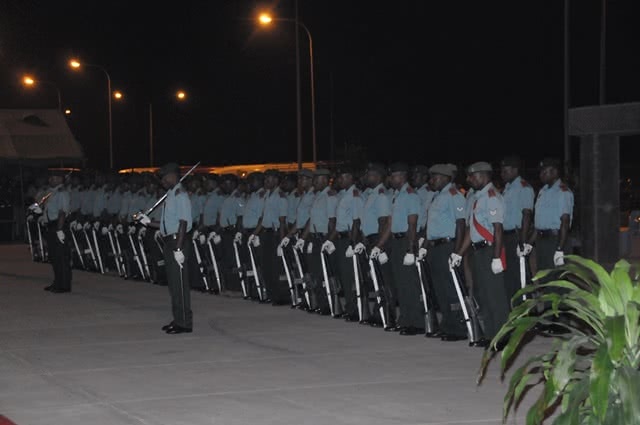 PNG Guard of Honour at the Remembrance Day Service
PNG Guard of Honour at the Remembrance Day Service
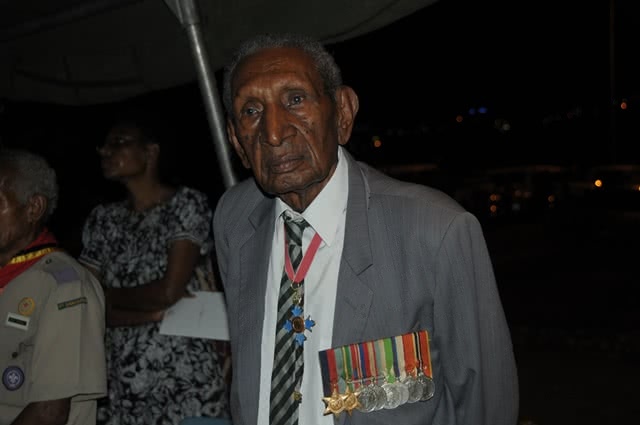 Reflective moment for Sergeant Ben Moide during the Remembrance Day Service
Reflective moment for Sergeant Ben Moide during the Remembrance Day Service
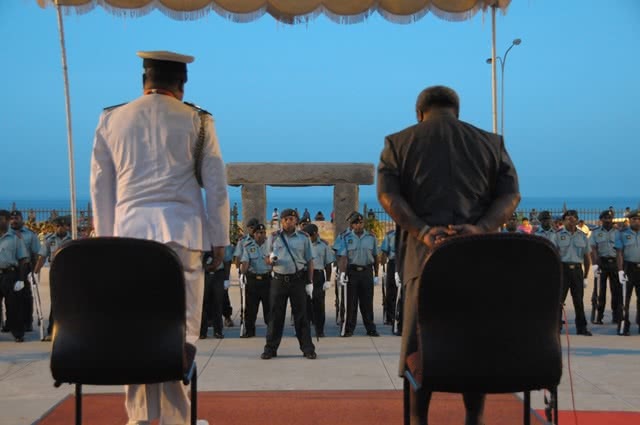 Dawn at the 2008 Remembrance Day Service in Port Moresby
Dawn at the 2008 Remembrance Day Service in Port Moresby
xxxxxx

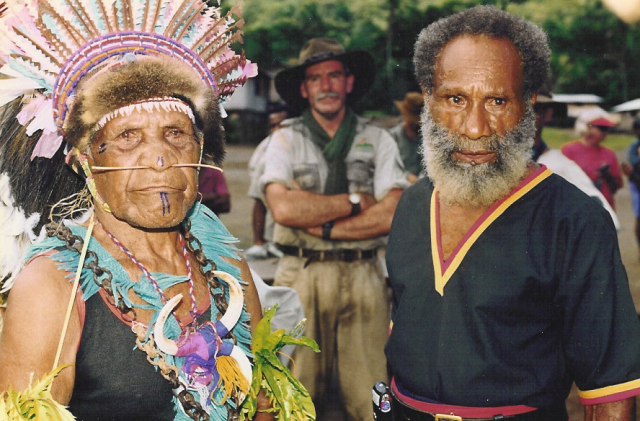

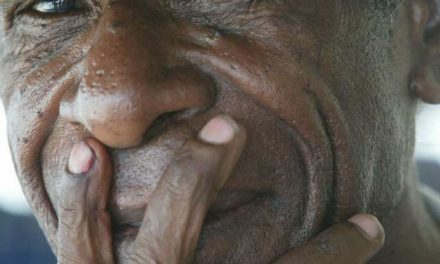
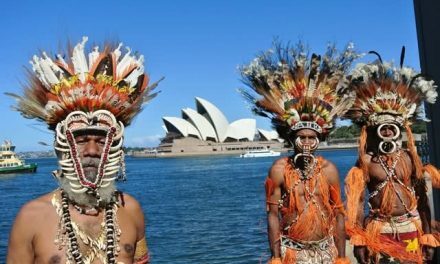
A wonderful tribute, Charlie, and a story I’m ashamed to know so little about, despite my association with PNG as a platoon commander in the 2nd Battalion, Pacific Islands Regiment. Well done, Adventure Kokoda, in continuing to shed light on the role of the PIB and the significance of the war from PNG’s perspective.
Ths is a wonderful tribute to the men who supported Australians during WW2. Their sacrifices although recognised by the few who care are not well known by the many who make u this nation we call home Australia.
A long time ago (1972) when we were young warriors, we of the 1st battalion RAR had the wonderful opportunity and experience to meet with the PIR. They were excellent soldiers in the bush, (many of them led by Australian officers) and completed our jungle training.
We met many a chap of the PIR who became friends but unfortunately through the mists of time we lost that contact with each other.
A wonderful and passionate article of a group of men who Australians owe much to. Well done.
A Great Man vanishing into the shadows… History takes its toll. It is now our job as the new generation to grasp the true value of his contribution in the war. Kokoda War is a significant event in the history of world war 2. It is a shame that, to date, facts that surrounds the war on that trail are still debatable. Adventure Kokoda, well done.
Ben’s World War 2 friends in Australia applaud the recognition being given to him and the PIB in recent days. Visitors to this Website may wish to learn more about the PIB and NGIB by going to the website: http://www.nashospng.com and click on the page PIB/PIR Assn.
A State Funeral is a very fitting tribute to a man who has served his Colonial masters with distinction and great valor in a war that was never his war. He remained an active represntative of the PNG’s Ex-Service mens league and never missed an ANZAC Day or the Rememberance Day Ceremonies and participated in these event by reciting the ODE in remembrance of his fallen comrades. A Geniune Green shadow who instilled respect and fear in the heart of the enemy. Sadly this is the first ever State Funeral accorded to an original Papuan Infantry Battalion Soldier or a Fuzzy Wuzzy Angel and will be the last. Sgt. Ben Moide has once again made history as a PIB Soldier even in his passing he sends a strong message to all of us the Australians and PNG people that we are greatly indebted to those Heroes that paid the ultimate price for the Freedom we enjoy today. The greatest reward for a great men such Ben Moide is that he has now stepped out of the Green Shadows into the Shadow of the Almighjt, may you rest in eternal peace Tuari Tauna, Bamahuta Tamagu. LAHUI LOVAI .
This is the Eulogy I read during the old warrior’s Funeral.
EULOGY
Late (Retired) Sergeant Steven Benjamin Moide
C Coy, Papuan Infantry Battalion
(Born: 1925; died: 30 December, 2013)
Good afternoon Excellencies, family, friends, and colleagues;
My name is Lahui Ako. I am one of the grandsons of the late warrior, of the Papuan Infantry Battalion, who lies before us today.
I stand here humbly before you all, at the beckon of the Ben Moide family and our whole extended family, to celebrate the life of this great Papua New Guinean. So I thank you all for this honour and privilege, to share this with you all.
(In Motu, seek permission from the family to use Bubu Ben’s first name during this eulogy for the benefit of everyone).
Each day, the ranks of this greatest generation of World War Two heroes, continue to suffer losses, not from the bullets and bombs of the enemy; but from illness and old age.
We are gathered here today because at around 11am on Monday, 30 December, 2013, one of the last of the Papuan Infantry Battalion’s remaining Non-Commissioned Officers – Benjamin Moide (or Ben Moide, as he was popularly known) – passed on to join that column of comrades marching to their final reward. Today, we pause to honour his memory and to celebrate a life well lived.
But who was Ben Moide? Yes, we all know that he was a WW2 veteran who fought in War 2. But who was he that upon his passing, we all gather here today to celebrate his life and remember him? Why have we travelled from as far as Australia to be here, might I ask?
In 2008, when Uncle Boge Lahui Ben-Moide, or Ralph, as he is popularly known, approached me one evening and said, “I think the time has come for you to write Bubu’s story, don’t you think?” I didn’t hesitate but said, “Why not!”
So, over the course of the next three (3) years, I travelled back in time to the 1940s and started roaming the jungles and hinterlands of Papua with the warriors of the Papuan Infantry Battalion – from their training camps in Port Moresby and Bisiatabu to the foot of the Owen Stanley Ranges and on to Awala, Kokoda, and Deniki, right across to the plains to the great Waria and Ope Rivers and then into Finschafen to make that historic landing; I slept with them in the bushes, ate hardman biscuits and bully beef with them; braved the rain, the sun, the flies, insects, disease; and death, and the strange sounds of the jungle in the deep of the night, and began to understand why the enemy was the enemy and why he was acting as such.
Most times, I would ask myself, would I have really fought with the PIB or evacuated with the rest of the Hanuabadans to the safety of Manumanu if I had been around then? This is the very question that this generation must take stock of as we continue to take our freedom for grant.
As I revelled in the presence of these heroes of the Papuan Infantry Battalion, I continuously hoped and prayed, while I wrote, for God almighty to grant this old man long life just so that he could personally launch his own book.
God, in his mysterious ways, answered my prayers. In July 2012, on the eve of the Remembrance Day celebrations, and with the generous support of countless friends from Australia and PNG such as George Friend, Greg Ivey, the Constantinou Group, Brian Bell, Michael Pearson, those esteemed gentlemen from the Rotary Club, and the UPNG Bookshop who helped published the book; “NAMELESS WARRIORS: the Ben Moide Story” was launched at the residence of the Vice-Chancellor of the UPNG. The inclusion of the Foreword by former PNGDF Commander, His Excellency Ambassador Peter Ilau added the icing on the cake.
One of the notable condolence messages I received this week is from H.E Mr Peter Eafeare, the PNG High Commissioner to Fiji, who last year took possession of a couple of copies and on his return to Fiji, presented a copy to H.E Ratu Epeli Nailatikau, the President of Fiji. Ratu Epeli, is a military man himself, a former Commander of the Fiji Military forces. Anyway, when High Commissioner Eafeare gave him the tragic news of Ben’s passing, the President expressed his most sincere condolences to the family, and wished them strength in this time of bereavement. High Commissioner Eafeare summed this condolence up nicely when he said, “From a Nameless Warrior, Ben has become a Timeless Warrior, as he rests in God’s eternal peace!”
During the writing of his biography, he always said that the war was a formative time in his life that forced him to grow up faster.
With that in mind, I would like to now invite you all to join me in reliving Ben’s life again on his final day on God’s earth.
From the very moment the war veteran walked into my grandfather Lahui Ako’s house at the invitation of his wife Henao Mou a couple of years after the end of War 2, it cemented what would be an everlasting relations between our two families – a relations that has continued ever since – even after he left the Lahui Ako residence to raise his own family.
In saying so, I would like to say that our family is very grateful for the outpouring of support from all sectors of the community received since the passing of our father, grandfather, great-great grandfather, uncle, and friend on Monday, 30 December, 2013. The culmination of his funeral arrangements today is tribute to this.
Today, as I look around the Church, I see a lot of faces, most of family, and of friends of family, but generally of friends. Yet to me, the faces I see gathered around here, are all faces of people who have known Ben; people who have loved and respected Ben; and people who were inspired by Ben.
Ben was friends to everyone he came across. Even when he launched his book in such humble surroundings, still friends came from afar: George Friend made the trip from the Gold Coast to surprise him at the launching of NAMELESS WARRIORS; while Ambassador Peter Ilau, who contributed the Foreword to the book, also made the long trip from Indonesia to attend the launching.
As such, your gathering here on his final day on God’s earth is no coincidence. In fact, it was predicted by Confucius more than a thousand years ago, when he said, “to have friends coming to one from distant parts, is not this a great pleasure?”
Retired Sergeant Steven Benjamin Moide died peacefully on Monday, 30 December, 2013, 88 years after his beloved Mother Nevea Gebai of the Motuan village of Pari brought him into the world. Upon his passing, he too, became a member of the cohort who have proudly served this great land of ours, and have passed on into the mist of time.
Like those veterans who have gone before him, Ben’s life involved so much more than this concise obituary. The members of the Papuan Infantry Battalion and the New Guinea Infantry Battalion who returned home after the war were, in fact, the first Papua New Guineans to have established and commenced dialogue with our Australian friends for a future partnership.
What they learnt from the Australians during the war, they put to use after the war. You see, Ben and his band of mostly nameless warriors were the forerunners, or shall I say, pathfinders, responsible for the shaping and rebuilding of the social, structural and moral foundations of their respective communities across this great land of ours which we continue to enjoy today.
73 years ago, a 16-year old boy ran away from home, falsified his age, and stepped forward among grown men, to defend his territory.
When Ben kissed his mother goodbye that fateful Friday morning in 1940 with only one thing on his mind, he didn’t realise that he would only see her one more time before she passed on. You see, when Ben’s parents went to visit him at Bisiatabu early in 1942 (the PIB had relocated to their new training camp at Bisiatabu to prepare for war and were allowing families to visit their sons, fathers, and husbands there), it was also to tell him that they were evacuating from Pari to Gaire village, due to the continuous Japanese bombing of Port Moresby. As they were leaving, his mother made him promise her that he would not kill!
Ben’s mother was a fervent Catholic, a follower of the new faith and a great believer in the Ten Commandments. But then, even as he vowed to keep his words to his mother, maybe out of guilt for “deserting her” when he ran away to join the army, his mind was full of questions he wanted to ask the enemy: What has my family done to deserve this? We don’t even know you or how you look like. My father and elder brother have never raided your village, steal from your garden, hunting or fishing grounds, or raped your women, yet your bombing has disturbed and destroyed my family’s comfort zone . . . and for this, you must pay!
When the Papuan Infantry Battalion met the enemy at Awala for the first time on the afternoon of 23 July, 1942, and when the teenager had firmly gripped his Bren and with such confidence squeezed down on the trigger in long bursts, the first word’s he uttered in this chaos in Motu was, “Sinagu, sori bada herea…!.” O Mother, sorry… as he sorrowfully apologized to his mother for breaking the promise he had made to her amidst the chaos around him.
But this was Ben’s nature. Apart from this apology, he had to make a statement to the enemy for destroying his family’s livelihood. When the Papuan Infantry Battalion officially encountered the enemy, Ben was only 18; and after these actions, one would have thought that he would be accepted as a true warrior by his brother NCOs. Sadly this wasn’t the case.
You see, the core of the PIB were ex-policemen; grown men; most had killed other men during raids up and down the coast, or had fought against the marauding inland tribes, but most importantly, they had been initiated into the traditional society. Ben was born in his mother’s village; and had not gone through the initiation ceremony to deem one a man.
However, Ben, despite this disadvantage, had an edge over his comrades. Ben, at 16 years of age, was educated according to the standards of that time. He was an English speaker; and English speakers were in high demand to make up the NCO Corp of the newly formed Papuan Infantry Battalion. It was to these English speakers, as well as former Police NCOs who could understand orders in English, that the commanders of the PIB looked to, to build a fighting force; one that would bear the first full brunt of the enemy while they waited for the allies to regroup.
Talking about the commanders of the Papuan Infantry Battalion, I was just informed a while ago by my good friend George Friend that Alan Hooper, Lieutenant, of “C” Coy, PIB passed away yesterday. Alan was Ben’s Platoon commander.
Ben had his work cut out for him and had to look out for his own safety, both from the enemy and from within. The PIB was formed by men from all the tribes of Papua; men who brought to the army their tribal animosities; men who were hellbent on taking revenge for past wrongs. There were sometimes knifings in the back in the dark of the night, as old scores were settled. Being an un-initiated NCO, he had a lot to prove and he did so with his wartime deeds; and during a break from the fighting, he made the long journey to his father’s village of Saguane to be initiated into manhood before returning to make the beach landings in Finschafen – as made man.
Today, as he lays here before us, the last of Papua New Guinea’s WW2 NCOs, I guess he has proven all his critics wrong. Because the way I see it, all his brother NCOs, men who fought the enemy simply because the enemy had intruded onto their tribal land and therefore had to be repulsed – men such as the princely Sama, a former Police NCO who became the PIB’s first official recruit; the most-feared Katue from whose deeds the enemy conjured up the now famous PIB nickname of “Green shadows”, the majestic Ehava boys who led forays into the enemy heartlands, and the legendary William Matpi, who, among his heroics and mostly unorthodox ways of waging war, was called in by the ANGAU commander at war’s end to dispel a possible riot by the PIR due to some racial tension, among a host of other heroes – have now formed a Guard of Honour at Ben’s final resting place, and anxiously await this service to end so that they can welcome their teenage warrior into their fold but this time as one of them, a tried, proven, and initiated PIB NCO.
It was to men like Ben and his comrades that the colonial administration unknowingly looked to assist rebuild the ravaged war torn land. Being educated and a good English speaker meant good opportunities for work in town then. So Ben was able to secure gainful employment as one of the two drivers of the post-war Administrator of the Territory, Colonel J. K. Murray; and being one of his drivers meant, driving the administrator throughout this whole locality, so that he could disburse his duties in rebuilding Port Moresby from the ravages of war. His opinion would have been sought and considered at great length too.
Ben also drove Dr Gunther around when he went out into the vicinity of the Waigani swamps to spy out land for a learning institute; and being the talkative person he was, I am sure he had something to do with the exact location of the University of PNG.
But it was during his employment at the Administrator’s office that Ben fell in love for the first time to the love of his life.
Right after the colonial administration rebuilt the village of Hanuabada, its people were encouraged to organize social events to while away their time amidst the ravages which the war had left. One of these activities was traditional dancing.
These dances were organized by the elders along clan lines and the young men and women were all encouraged to participate in these dances. These dances were usually done in the evenings and brought forth young and old alike to participate and or spectate.
So most evenings after work, Ben would spend his time at the dances, spectating. In fact, Ben would stay out late most nights, much to the anger of my grandmother, Henao Mou, who would most times, send her daughters, (my aunties) to collect him. Every time he returned home from these dances, my grandmother would lecture him about the dark, the spirits, and all the legends and fables of that time; Ben would always smile at her, eat his dinner and go to bed.
One evening, he went down to the village square to enjoy what had become his after-work past-time. That evening, the dances were organized by the Vahoi clan, and that particular evening, Ben fell in love forever!
It so happened that as he continued to watch the women swaying in their grass skirts, his eyes fell upon a beautiful young lass dancing in the midst of her seniors. As Ben watched this girl perform, a strange feeling of ownership overtook him; he wanted to make this girl his own. Suddenly feeling that everyone was watching him, he quickly got up from where he had been sitting and left, hoping that no one had noticed him, especially his intent stare at one particular dancer in the crowd. For the first time that night, Henao Mou looked up with utter surprise on her face when Ben arrived much earlier than usual, and went straight to bed.
The following evening, Ben returned to watch the dances; this time, determined to learn the girl’s name. Again he got himself completely lost in the ecstatic feeling of watching her dance. But this time he got caught!
Ben had not realized that he had been followed to the dances by one of Henao’s daughters until my late Aunty, Ranu Lahui surprised him by poking him on the side and said, “Her name is Maba; Maba Daroa. She is very beautiful, isn’t she, Uncle Ben?” Aunty Ranu winked at him.
“What are you talking and winking about?” Ben stumped back.
“Aww come on, Uncle Ben. It is very obvious and written all over your face that you are truly smitten by her. Come on, give me some money and I will go and buy her a gift of betelnuts and tell her that they are from you.”
Without thinking, Ben quickly dug into his pockets and gave the girl some money.
Aunty Ranu came back a few moments later and as Ben looked on expectantly at her, she answered, “She said to thank you for the gift of betelnuts!”
Aunty Ranu and my other aunties became the daily conduit for messages between the two young lovers; whose love grew and blossomed every day. If you must know, my late aunty Ranu is the mother of Major Edward Ga’a.
Their love for one another was such that despite the disagreement of the girl’s family on this relationship, which even included a court summons after Ben had eloped with his girl to Pari, a situation which Henao Mou quickly moved to smooth things out with Maba’s family; who were obviously on the warpath as such practices were unheard of in those times, and traditional law demanded compensations and reparations; it was obvious for all to see – the two young lovers were going to spend the rest of their lives together.
So it came to pass that under Henao Mou’s organization and coordination of the whole extended family network – hers and her husband’s – Ben’s bride price was prepared at the Gunina-Laurina clan and paid to the Vahoi family and his status as a made-man in the Motuan society was confirmed. It was an “awesome” day (as the younger generation of today will say), as relatives from all over Port Moresby, including those from Pari and Ben’s own siblings, came to Hanuabada to celebrate Ben’s bride price payment, and marriage to the love of his life, Maba Daroa.
As far as all the Motuans up and down the coast were concern, Ben had concluded the traditional Motuan obligations of marriage. His father Moide Enagi had done it nearly 30 years earlier. Now his son, Ben had again broken the very conservative ideals of the traditional Motuan distrust of all things non-Motuan. But most importantly, in doing so, Ben had united two families.
That night, Ben brought his wife into his elder sister, Henao Mou’s house to commence another chapter in his life, but this time with his wife at his side.
A year later in 1953, Ben and Maba were blessed with the arrival of a son, whom they named Boge Lahui Ben-Moide (Lahui after Henao’s husband, Lahui Ako). Two years later, their first daughter arrived and they promptly named her, Margaret Henao Ben-Moide (Henao after Henao Mou). Then followed John Ben-Moide, Daroa Ben-Moide, Arua Ben-Moide, Hetahu Gwen Moide, and Lohia Ben-Moide, bringing up the rear of this esteemed family.
Ben’s contribution to society did not end with his marriage. No! Ben also tried his hands at the game of cricket and lawn bowls too. Better still, he was also a prolific Rugby League player. He was a member of the powerful Magani outfit in 1961 to 1962 and was instrumental in the formation of the inaugural Poreporena Rugby league competition in the late 1950s, which paved the way for the formation of the famous Hanuabada Hawks Rugby League Club; a club which all rugby league-minded Hanuabada boys aspire to play in.
The father laid the foundations and the sons extended this legacy. Ben’s legacy to the formation of rugby league in Port Moresby and for that matter in PNG, was greatly emulated and if not, enhanced by his sons, John, Daroa, Arua and Lohia. All four of them have represented PNG during the course of their rugby league careers and have contributed to the development of the code in their own ways. Daroa, in particular, played with the Petone Club in the Wellington competition in New Zealand in the late 1980s where he also became the first Papua New Guinean to represent the Wellington Representive side. Arua, is currently one of the trainers of the PNG Hunters team getting ready to compete in the Queensland Cup competition for the first time.
Ben was President of the PNG Returned Servicemens League from 1982 to 1983; and during this time was a salesman for the then San Miguel Beer Company and later with SP Brewery when merger occurred between these two beer companies. He was SP’s Senior Sales Representative when he retired in 1991.
1991 was a very significant year for Ben. While he was getting ready to enjoy his retirement with the love of his life, tragedy struck! His love affair with his beloved wife Maba Daroa sadly ended on the morning of Thursday, 24 January 1991 when she was called to rest by the Almighty God leaving him a widower.
Today, with his passing, Ben’s legacy will live on in his family. Ben leaves behind his children, 45 grandchildren; and 46 Great-grandchildren.
Finally, I only came to truly know this great man when I started writing his biography; and from 2008 to 2011, the both of us spent countless hours together – one quarter of the time on his “official biography” while the remaining three-quarters was spent on the parts of his wartime experiences which he forbade me to write about; saying, “some things are better left unsaid, in respect of the dead, as well as to ensure that there is harmony in our future lives.” I can truthfully say that if he had allowed me to write EVERYTHING he said, Nameless Warriors would have been in a Trilogy.
It was obvious from our talks, that there was a lot of love from this father, grandfather, and great grandfather. He adored his children. For me, it’s not so much as the activities he enjoyed with his family; Yes, they were special moments. But rather the example of a life well lived that I admire the most. Ben was an example for so many, and yet he was unassuming. He loved his red wine.
I cannot help but have admiration for a man who runs away at 16 to join a cause which he didn’t understand much at all; yet, he enlisted, on his own accord, into the Papuan Infantry Battalion, and became a veteran of World War II. Ben loved life.
I don’t know about you today, but when those final hours of life are left for me on God’s planet, I don’t want to talk about paying bills, or sporting events, or those materials possessions that come and go. I want to be with the ones I love and remember the love that I gave to others. But then as human beings, these are mere whims; After all, God almighty has already predetermined our lives on His earth.
In Ben’s final days and hours, this is how it was, he was with those he loved—and what a blessing that was for him and for his immediate family.
As Christians, we believe that there is eternal life for those called to rest by God Almighty, Maker of everything. On earth, I think there is also eternal life as long as we are remembered by others.
When I look at Uncle Boge, John, Daroa, and Lohia, and Aunties Margaret and Gwen, and Ben’s grandchildren and great grandchildren, and all of you here today who knew Ben, I see and hear him alive in each one of you. This is Ben’s final gift to us all; to look back at his life’s achievements and, wholeheartedly to build on them for a greater and prosperous Papua New Guinea from here on. After all, he helped build this great nation of ours after the war.
We can all come to conclude that Ben’s life was a song that always rang true, with a strong steady beat and gentle melody that warmed the hearts of all who heard it.
An American Indian proverb says: “When you are born you cry and those around you rejoice. Live your life to the fullest so that when you die, you will rejoice and those around you will cry.”
Ben has truly lived his life to the fullest.
When the last post and reveille sounds this evening after he has been laid to rest, I know that everyone around these parts, who know its meaning, will quickly hush the chattering children around them, to say, “hush little one, be quiet now, one of our warriors is finally going to bed…” and everyone will stand to, to rock the warrior to eternal sleep.
May God’s love surround us today.
AMEN!
© Lahui Ako, author of NAMELESS WARRIORS: The Ben Moide story.